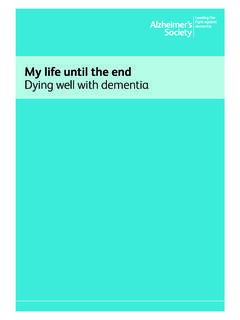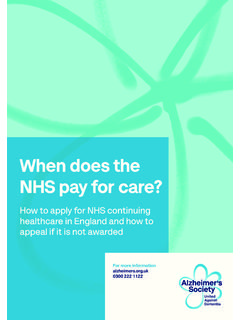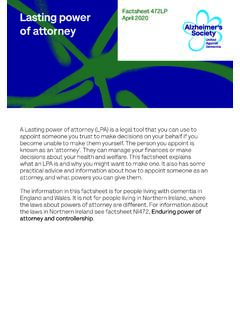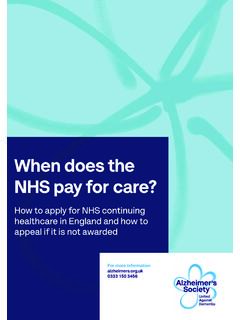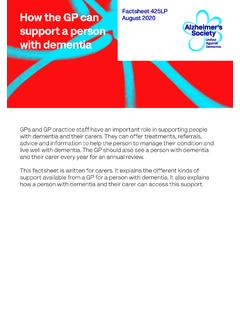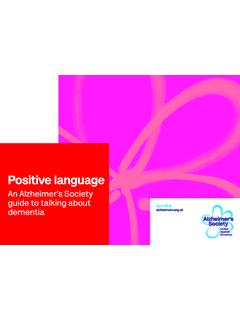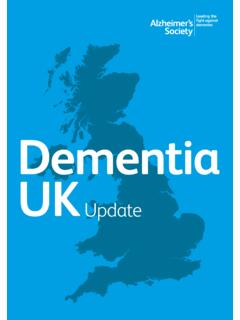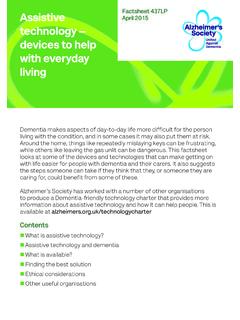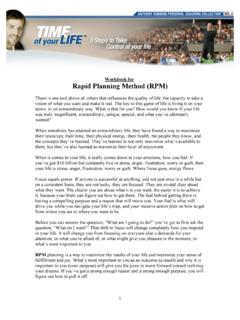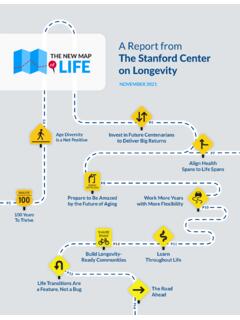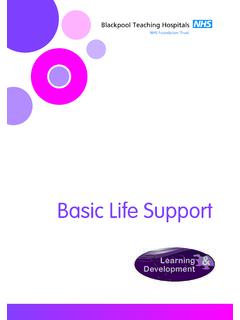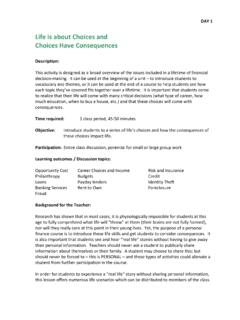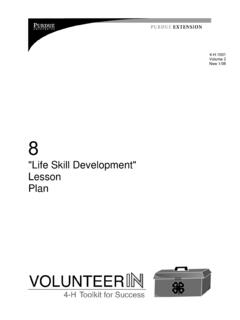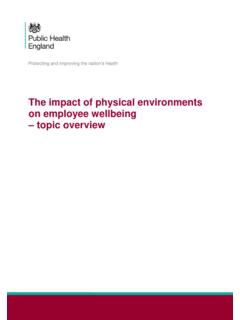Transcription of Factsheet 450LP Risk factors for June 2021 dementia
1 Risk factors fordementiaFactsheet 450LP June 2021 dementia is not a natural part of ageing. It is a set of symptoms that develop when the brain is damaged by disease. There are many things that can increase a person s chances of developing dementia these are known as risk factors .There are different types of risk factors for dementia , including medical, lifestyle and environmental factors . It is possible to avoid some risk factors , while others cannot be Factsheet describes the risk factors for the two most common types of dementia Alzheimer s disease and vascular dementia . It is written for anyone who wants to know more about what increases a person s chances of getting advice on how to lower your chances of developing dementia , see booklet 35, dementia : reducing your factors for dementia2 Contents n What do risk and risk factor mean?
2 NWhat are the risk factors for dementia ? Ageing Genes Gender and sex Cognitive reserve Ethnicity Health conditions and diseases Lifestyle factors nOther useful organisationsRisk factors for dementia3 Risk factors for dementiaWhat do risk and risk factor mean?A person s risk of developing dementia is the chance that they will get it at some point in their life . Everyone has a chance of developing dementia , but some people have a greater chance than others. These people are at higher risk .A risk factor is something that is known to increase a person s chances of developing a condition. For example, ageing is a risk factor for dementia . This means a person who is aged over 75 is more likely to develop dementia than someone who is under risk factors for dementia cannot be reduced or avoided but many others can especially with the right support.
3 For more information see What are the risk factors for dementia ? on page s important to remember that a person may still get dementia if they avoid risk factors and have a low risk . This is because having a low risk only makes a person less likely to get dementia . It does not mean they will definitely avoid risk factor is something that is known to increase a person s chances of developing a Factsheet is about risk factors for dementia caused by Alzheimer s disease, and heart or vascular disease (vascular dementia ), unless stated otherwise. Very few studies have looked specifically at risk factors for less common types of dementia , such as frontotemporal dementia (FTD) or dementia with Lewy bodies (DLB).Risk factors for dementia4 What are the risk factors for dementia ?There are several known risk factors for dementia .
4 Some factors only slightly increase a person s risk while others make it much more likely that the person will develop the most people, the biggest risk factors for dementia are ageing and genes. A person s risk of getting dementia can also be increased by their: ngender and sex nethnicity namount of cognitive reserve the brain s ability to cope with disease nother health conditions, if any nlifestyle for example, smoking and excessive alcohol use nexposure to air can find information on all of these risk factors in the following risk factors for dementia can t be avoided for example ageing and genes. However there are lots of risk factors that can be avoided, or at least reduced for example smoking. Around 4 in every 10 cases of dementia may be prevented by avoiding some of these risk person can avoid some risk factors for dementia by making healthy life choices, such as not drinking too much alcohol.
5 However, they may need wider changes to happen to avoid other risk factors for example, effective environmental policies are needed to reduce air pollution. For more information on reducing your risk through individual lifestyle choices, see booklet 35, dementia : reducing your factors for dementia5 AgeingThe biggest risk factor for dementia is ageing. This means as a person gets older, their risk of developing dementia increases a people aged between 65 and 69, around 2 in every 100 people have dementia . A person s risk then increases as they age, roughly doubling every five years. This means that, of those aged over 90, around 33 in every 100 people have is a risk factor for dementia because dementia can take a long time to develop. This is because dementia is caused by diseases that damage the brain, such as Alzheimer s disease or vascular disease.
6 It can take these diseases many years to damage the brain enough to cause the symptoms of dementia . This means that the longer a person lives, the more time there is for dementia to is also a risk factor for dementia because an older person is likely to be coping with other changes and health conditions that can increase their risk. For example, an older person is more likely to have: nhigh blood pressure nblood vessels in the brain that are damaged, twisted or blocked na greater risk of having a stroke ncells in the brain that aren t as active as those of younger people na weaker immune system na slower ability to recover from a person ages, they will also become more physically frail over time. Along with the changes listed above, this can make a person more likely to develop problems with their thinking and older people are at a higher risk of dementia , younger people can still get it.
7 At least 1 in 20 people with dementia developed the condition when they were aged under 65. For more information see Factsheet 440, What is young-onset dementia ?Risk factors for dementia6 GenesThere are certain genes that may be passed down (inherited) from a parent that can affect a person s chances of getting dementia . There are two types of these genes: familial genes and risk genes will definitely cause dementia if they are passed down from a parent to a child. If one parent has a familial gene, their child will have a 1 in 2 chance of inheriting it and developing dementia usually when they are in their 50s and 60s. Familial genes are very rare for most types of dementia . However, these genes may be the cause of around 1 in 3 cases of frontotemporal dementia , which is a less common type of genes increase a person s chances of developing dementia .
8 They are much more common than familial genes. However, unlike familial genes, risk genes do not always cause a person to develop dementia . More than 20 risk genes have been found so far and most of them only slightly increase a person s risk of most important risk gene for dementia is called apolipoprotein E (APOE). Certain versions (variants) of the APOE gene can make a person up to four times more likely to develop Alzheimer s disease than people who don t have this version of the gene. However, it s important to remember that these higher-risk versions still don t always cause dementia . Most people with higher-risk versions of the APOE gene don t ever develop the more information see Factsheet 405, Genetics of factors for dementia7 Cognitive reserve Cognitive reserve is a person s ability to cope with disease in their brain.
9 It is built up by keeping the brain active over a person s lifetime. The more cognitive reserve a person has, the longer it takes for any diseases in their brain to cause problems with everyday tasks. This means people with a larger cognitive reserve can delay the start of dementia symptoms for a longer period of time. People with a smaller cognitive reserve are at a higher risk of getting dementia in their three most important factors that can lead to a smaller cognitive reserve are: nleaving education early: a person who left school at an early age is more likely to have a smaller cognitive reserve than a person who stayed in full-time education for longer or who continued learning throughout their life nless job complexity: a person who has not used a range of mental skills during their lifetime of work for example, memory, reasoning, problem-solving, communication and organisational skills is more likely to have a smaller cognitive reserve nsocial isolation.
10 A person who has not interacted much with other people during their life may also have a smaller cognitive means these factors are also risk factors for a lot of a person s cognitive reserve is built up during their childhood and early adulthood, there are many things a person can do to increase their cognitive reserve later in life , such as staying mentally and socially factors for dementia8 Sex and genderOverall, there are more women than men living with dementia . This is mostly because women tend to live longer than men (see Ageing on page 5). The risk of getting dementia is about the same for men and women. However, women who are currently over 80 have a slightly higher risk of getting dementia than men their reasons why women over 80 have a higher risk of dementia than men over 80 are still unclear.
